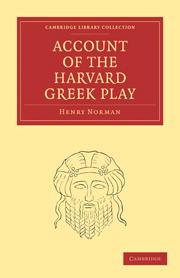Book contents
- Frontmatter
- Contents
- Illustractions
- PREFATORY NOTE BY PROFESSOR W. W. GOODWIN
- INTRODUCTION
- I THE ORIGIN OF THE PLAY
- II SOPHOCLES
- III “OEDIPUS THE KING”
- IV THE PREPARATION OF THE PLAY
- V THE PERFORMANCES
- VI IN RETROSPECT
- APPENDIX 1 THE CIRCULAR OF THE COMMITTEE
- APPENDIX 2 THE PROGRAMME
- APPENDIX 3 A BIBLIOGRAPHY OF THE PLAY
- Plate section
- Frontmatter
- Contents
- Illustractions
- PREFATORY NOTE BY PROFESSOR W. W. GOODWIN
- INTRODUCTION
- I THE ORIGIN OF THE PLAY
- II SOPHOCLES
- III “OEDIPUS THE KING”
- IV THE PREPARATION OF THE PLAY
- V THE PERFORMANCES
- VI IN RETROSPECT
- APPENDIX 1 THE CIRCULAR OF THE COMMITTEE
- APPENDIX 2 THE PROGRAMME
- APPENDIX 3 A BIBLIOGRAPHY OF THE PLAY
- Plate section
Summary
LESS than a mile and a half from Athens stood the hill of Colonus. Its beauties have been sung by its own poet.
O stranger, thou hast reached the dwellings of a land
Where noble steeds are bred, — earth has no better homes —
Colonus, with a gleaming altar crowned. Here, too,
The clear-toned nightingale pours forth her plaintive note
Down in green glades where purple ivy grows,
The ivy which she loves, and where the thicket grows
Sunless, untrodden, shaken by no winds, a fruit
Of myriad berries bearing, sacred to the God.
There joyous Dionysus wanders ever
In happy frolic with the Nymphs who care for him;
And nourished by the falling dews of heaven each day
The clustering narcissus blooms, the ancient crown
Of mighty Goddesses; and there its golden head.
The crocus shows. The sleepless rills which flow
To feed Cephissus’ streams are never dry, but with
Each day their quickening waters o'er earth's bosom flow.
The chorus of the Muses does not shun the spot,
And Aphrodite with her golden reins is there.
It is no wonder that the dwellers in this favored place were proud to call themselves Coloniatae, as well as Athenians. And another distinction was added to Colonus, which was destined to outlast all the rest; a voice which should ring out for ages after the sacred groves had changed to “cold, bare, ruin'd choirs”; a power which should live on “to better and convert mankind” when Dionysus had become a dream and Athena but a vision. It was the birthplace of Sophocles.
- Type
- Chapter
- Information
- Account of the Harvard Greek Play , pp. 20 - 28Publisher: Cambridge University PressPrint publication year: 2010First published in: 1882



